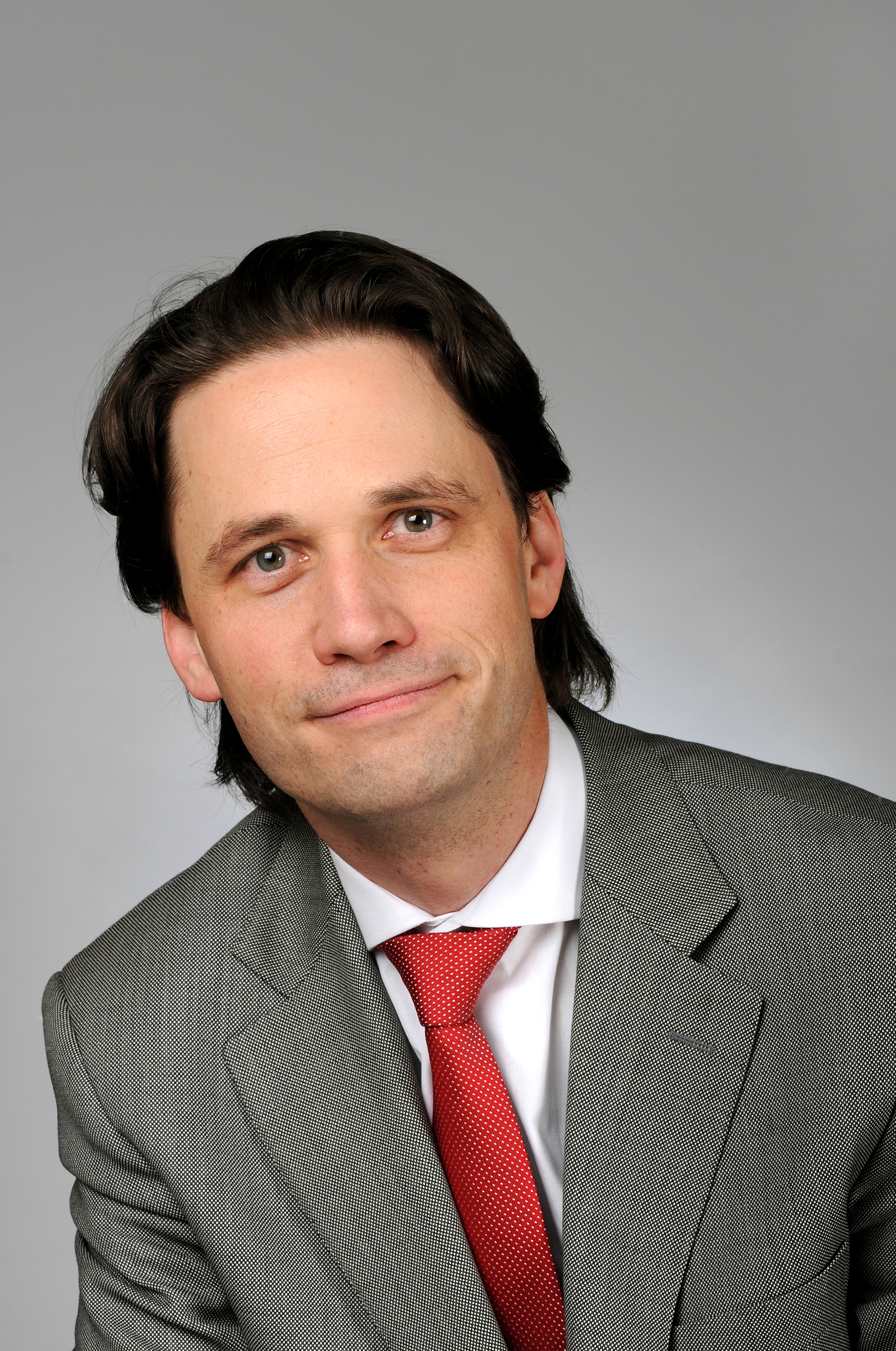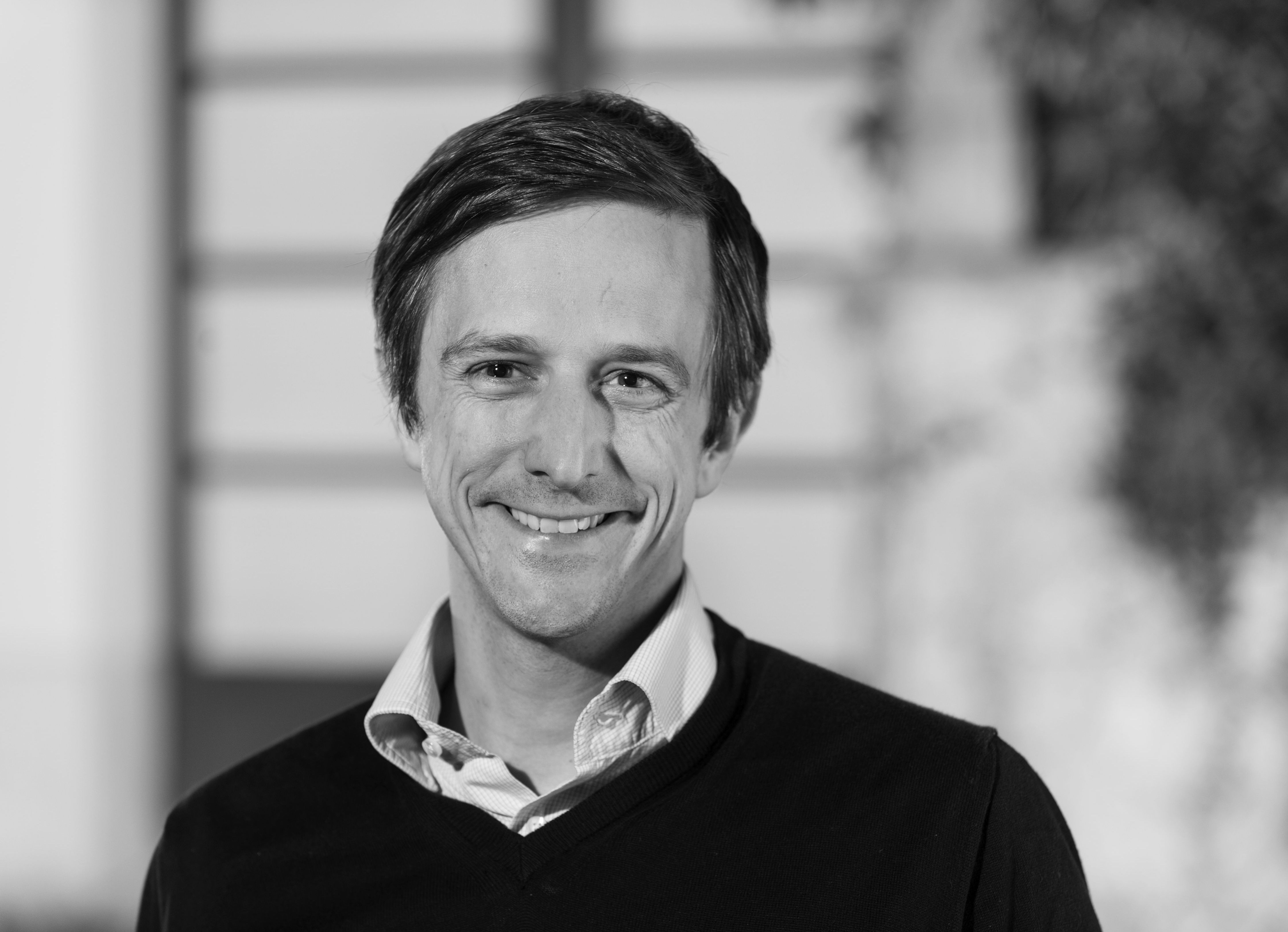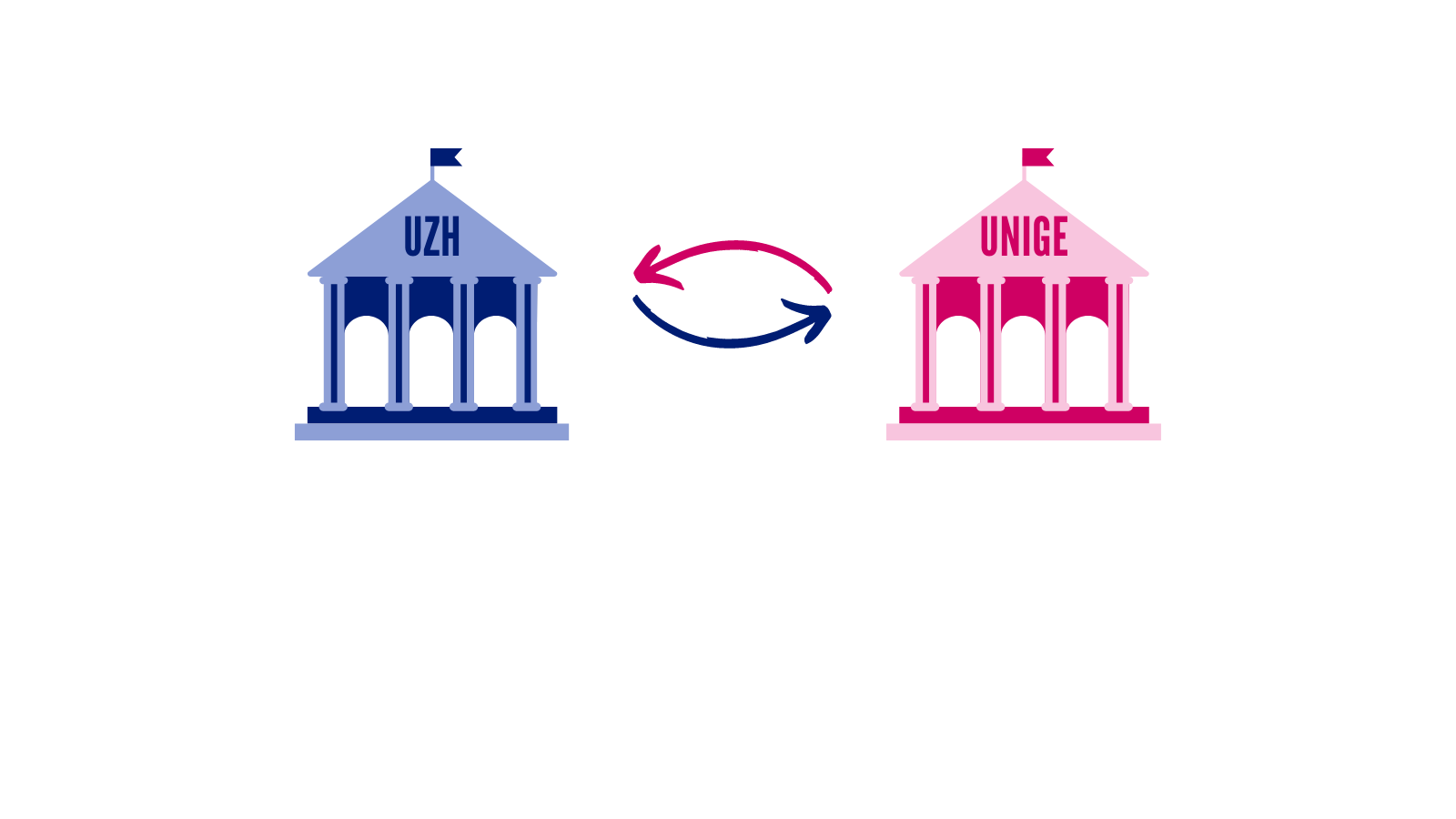
Research exchange: an impact multiplier
Dr. Ning Wang, an ethicist and a political scientist from the University of Zurich, carried out a research exchange at the Geneva Centre of Humanitarian Studies from October to December 2021. Initially designed to develop a joint paper with Prof. Karl Blanchet (UNIGE) on the public perception of the “humanitarian drones”, this exchange resulted in a variety of related initiatives. In an interview, she revealed the multidimensional benefits of such research exchanges. In addition to being a rewarding measure for young researchers, such academic visits bring an undeniable added value not only to universities, but also to society more broadly.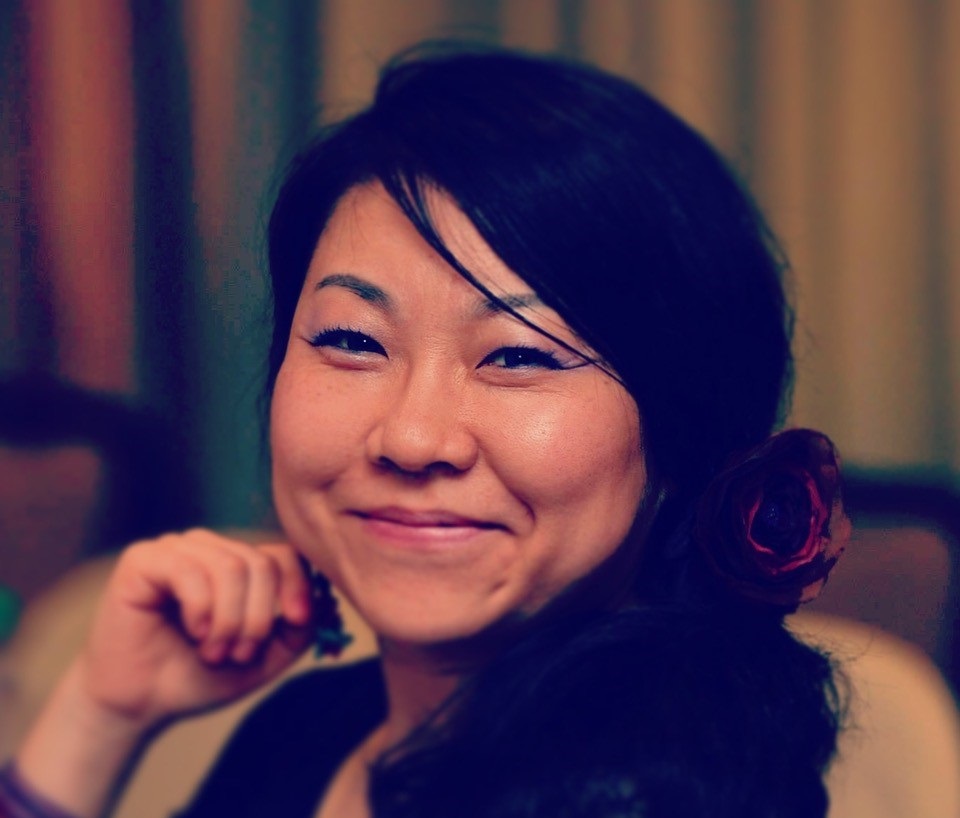
For Ning Wang, it was evident that carrying out an exchange at the Geneva Centre of Humanitarian Studies with Karl Blanchet would bring mutual benefits given the complementarity of their expertise. She is an ethicist interested in the humanitarian use of technology, and has experience working in headquarters of renowned humanitarian organizations. Karl Blanchet is an expert in, among others, global health in conflict-affected and post-conflict territories. He thus has great knowledge and experiences in the humanitarian field.
As Ning Wang insightfully described, their combined expertise evolved as a strength multiplier. This, however, could not happen without one critical element: in-person exchanges.
The benefits of “organic” exchanges
Switzerland is a very diverse country. If it is especially true regarding cultural elements, it is also the case in terms of scientific expertise. Moreover, Geneva is home to a large number of international organizations and beats to the rhythm of humanitarian work, whereas Zurich is a recognized hub for new technologies and innovation. While joining forces to co-produce knowledge is crucial for universities, it is also the best way to boost concrete impacts. But how do you determine common interests and bring together different insights on the same issues for greater effect? Meeting people, according to Ning Wang, is the best way: “when you’re in a research exchange, by definition, you exchange. It’s so organic, you don’t have to make an extra effort”.
“When you’re in a research exchange, by definition, you exchange. It’s so organic, you don’t have to make an extra effort”.
Ning Wang
That is how, for example, Wang and Blanchet found a common interest in participating in the renowned event of the International Committee of the Red Cross (ICRC) called the ICRC Analysis and Evidence Week. Ning Wang hosted a technical session on the dissemination of the Framework for Ethical Assessment of Humanitarian Drones (FEAHD). This broader interdisciplinary project helps to make strategic and ethical decisions as to whether or not to use drones in humanitarian contexts. As the diversity of participants showed, interests surrounding this topic defied disciplinary and sectorial silos among the private and public sectors, academia, and the humanitarian field.
Beyond this important event, the two scholars wanted to go further and give back to society in an even more concrete manner, in the context of a joint research project.
Give back to society
Once back in Geneva, Ning Wang and Karl Blanchet looked in more detail at a particularly interesting case study, inspired by a project on drones for transporting patients within Geneva. It was reported that in 2019, the Canton of Geneva gave its approval to develop an air ambulance drone prototype. When discussing such a ground-breaking innovation, ethical considerations may come into play, reminded us Wang. More precisely, public acceptance of such initiatives should be carefully studied, before, during, and after its implementation.
The two scholars hence decided to actively contribute to this topic involving desk research and fieldwork. “It’s all about finding purposes,” affirmed Ning Wang regarding the rationale of a joint research. They are now working on a multi-method study for evaluating the patterns of public perceptions of drones.
A collaboration multiplier
Last but not least, another major added value of a research exchange is that unexpected collaborations may arise from conversations with other researchers. When chatting together, Audrey Mahieu and Ning Wang realised that they could contribute to each other’s work. Audrey Mahieu was involved in humanitarian work in places such as Afghanistan. She revealed some concerns sometimes raised by her fellow humanitarian workers on different topics, such as the range of their responsibility. To Ning Wang, some of these could be tackled through an ethical lens. Realising that these questions could potentially affect the well-being and the mission of a multitude of humanitarian workers, Wang and Mahieu are now considering creating a podcast tackling issues raised by frontline humanitarian workers.
Ning Wang’s research exchange might be over, but the exciting projects that emerged from it have only just begun!

A Covid-19 exchange story
Charlotte is a law student from the University of Geneva who carried out an exchange at the University of Zurich during the first year of her Master’s degree in 2019-2020. During an interview, she reveals why she chose to do a student exchange in Zurich and how surprisingly well she adapted to the lockdown.
How did this experience benefit you ?
First of all, I would say that it helped me practise German, because I come from the canton of Vaud, so I haven’t had the opportunity to speak it since high school. But German is a language that is spoken a lot in Switzerland; not as much on the French side, but on the other side of the “Röstigraben” as they say. It’s true that, especially in law, German must be spoken and understood, because we have a lot of federal court decisions that are rendered in German and writings of legal scholars and if you don’t speak or understand it, it can be complicated.
Did you choose Zurich mainly for the language?
Yes. But also, after having done my Bachelor’s degree in Geneva for 3 years, well… it was nice, but I also wanted to see other cities. Plus, I had friends who went to Zurich before me and who told me “Oh, Zurich is great!” So I went there and, indeed, the city is different, and the people, too.
And then we were a little unlucky as Covid hit, so all the classes were online. But I was rather lucky because was staying in a student dorm, a whole building with students. Quite a few students also stayed during the first lockdown. So, yes, I stayed because I really wanted to finish the year and improve my German. I thought about coming back to Geneva, but just following online classes in German is not enough to practise the language.
That’s why I stayed there and I don’t regret it for a second!
So, during the first lockdown you stayed in Zurich, your classes were all online, but you don’t regret anything. Can you tell me more about this period?
Everything was online, we could ask our questions to the professors, and they answered by email or made podcasts answering all the questions. But what made me stay – and it often depends on what kind of flat share you are in – is that I was lucky to be in this building with a lot of students and they also had online classes. It was stimulating to see the others working and so I thought “OK, I have to keep on studying.” When talking with friends in Geneva, I kept hearing remarks that the first months of lockdown were very complicated for them, whereas for me, life went on as usual. I saw the others working, we continued to work together, and in the evening we met, had dinner and did activities together. It’s true that the first lockdown, I almost didn’t feel it, and when I came back to Geneva and we had a second lockdown, it was horrible and I truly understood what a lockdown meant.
Above all, there were German students whom I spoke German with, and international students with whom I spoke English. And again, I was lucky to be a part of a flat share with a cinema room, a party room, a gym. We even had a rooftop for barbecues! And I think that’s what made the experience into such a good memory. You really have to try to find a flat share or just this kind of place and that’s where you really have a lot of things to experience.
Anything else to share?
Honestly, if I had to point out one thing, it would be to get started much earlier. In fact, German “scares” a lot of people from the French-speaking part of Switzerland. There are a lot of people who get tense as soon as German comes up, and they don’t want to speak this language, whereas there is a large part of Switzerland that speaks it.
I would also advise to dare speak German. The more we speak, or even try to send messages in German and so on, the better it is. That’s the only way to get there. Finding a tandem partner is also very helpful. And ask German-speakers to correct us, because otherwise we always do the same mistakes.
And yes, really, don’t be afraid and go for it!

New call for projects: “Engaging Science and Society for More Resilience”
UNIGE and UZH just launched their new call for projects 2021-2022 on the following theme: “Engaging Science and Society for More Resilience”. Four to eight projects will be selected, with a grant of min. 20’000 to max. 30’000 each. The deadline for the application is 9 January 2022.

The theme selected echoes the many challenges that the society as a whole is facing at the moment. With several successive global crises, may it be in terms of health, climate, biodiversity, economy and many others, inclusive solutions are needed more than ever.
To help build this crucial path towards resilience, special attention will be given to projects that foster the dialogue between science and society and/or politics. The funding scheme is open to all academic disciplines. The proposals can be focused on a single discipline or be of interdisciplinary character.
They may, for example, tackle the following questions (non-exhaustive list):
- How to engage society in finding solutions for tackling the challenges facing us?
- How can science be better utilized to make societies more resilient?
- How does science impact society and politics (and vice-versa)?
For all additional information, visit the project submission platform.
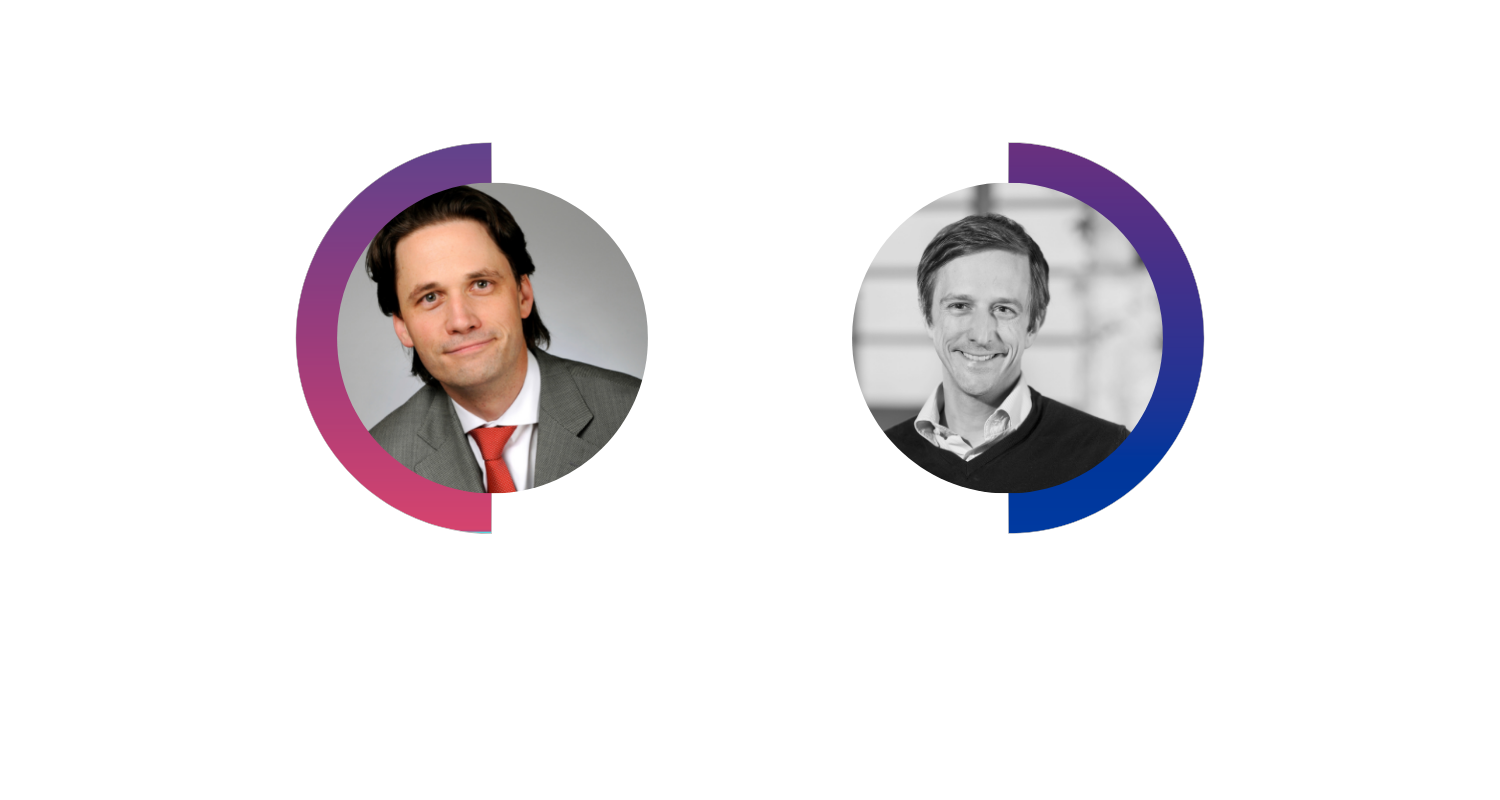
Bilingualism in law through the exchange of professors
In their project “Language and interpretation skills for Zurich and Geneva law students”, Professor Marc Thommen and Professor Yvan Jeanneret promote academic mobility by organising exchanges for teaching staff between the University of Geneva and the University of Zurich. The participants from Geneva teach law lectures in French in Zurich, and vice versa. In an interview, the two professors reveal the host of benefits brought up by these exchanges.

Prof. Yvan Jeanneret, Faculty of Law, UNIGE 
Prof. Marc Thommen, Faculty of Law, UZH
This professorial mobility first emerged as a result of their friendship. They both wanted to exchange with one another, but above all, they each wanted their students to benefit from their colleague’s expertise. To this end, each one travelled to the other university to give lectures in their own working language. For them, the strategic partnership between UZH and UNIGE has been a way to institutionalise their activity and expand it to other disciplines of law.
For Prof. Jeanneret and Prof. Thommen, this project is also the result of a necessity: in Switzerland, “one cannot be a lawyer without being able to easily understand the other main national language” notes the UZH professor. And most of the time, students acknowledge the chance they are given.
Benefits for the students
The professors gladly underline that the vast majority of the students are very interested and happy to participate in these classes. They recognize that following classes in German or French concerning different domains in law is a great opportunity and a door-opener for their future career. This “micro exchange” can even serve to “break the ice” with the foreign language, explains Prof. Thommen. After successfully following a class in the other language, students feel proud of themselves, he notes. This successful experience might give them the courage to pursue their learning in the other language, or even to spend a semester at the other university. Indeed, Prof. Jeanneret is also convinced that it encourages further student mobility. Students may easily ask themselves, he notes, “I succeeded in this class, why wouldn’t I follow a semester in Zurich?” [Note: you can read more about the experiences of exchange students in law in our student testimonials section.]
“There is a double enrichment, quite clearly”
Prof. Yvan Jeanneret
More than just language, this experience is an added value for their studies in law per se. “There is a double enrichment, quite clearly,” affirms Prof. Jeanneret. Firstly, as every professor has their teaching specificities and visions of the field, students discover new perspectives, values, and mindsets that they would otherwise not have been confronted to. And secondly, it is also a question of scientific method. By apprehending different materials in the two main national languages, students can better analyse and compare them – a crucial point when practicing law in Switzerland.
Interested to see how much students retained and understood the classes held by his Swiss-German colleague, Prof. Jeanneret once asked a simple question at an exam on the material taught by Prof. Thommen. While it was possible to know the answer simply by reading the law itself, most students used the exact same German word employed by the UZH professor. “They had hit on the concept, on the word. So I’m pretty sure that the message is getting through,” assures Prof. Jeanneret.
Benefits on the teaching side
If this project is highly beneficial for students, it is not any less for professors and teaching staff. The project was quickly enlarged and now several researchers from different domains in law have joined the endeavour. And even if this experience can be seen at first as very demanding due to the professors’ busy schedules, they all return very satisfied from the trip. “All the professors were very happy to exchange with their colleagues,” says Prof. Thommen. Whether it be personally or professionally, this experience is also an occasion to meet new people and facilitate projects that would probably otherwise not take shape.
While sharing experiences and knowledge with colleagues is valuable, it is even more so with students, thinks Prof. Thommen. For him, the most rewarding was to discover “the view and the way students from Geneva handle things.”
In terms of teaching skills, too, this exchange is very beneficial. Giving a lecture to students in a language other than their native one requires to work on a clear and simple language and structure. Endless or convoluted sentences are detrimental: “it is a re-learning of the basics,” says Prof. Jeanneret. He even compares this exercise to teaching first-year students who are complete beginners.
Because the direct exchange with students is at the heart of the project, the Covid-19 pandemic forced the team to take a break. Now the professors cannot wait to take up the exchanges, meet up again with students and colleagues and keep the ball rolling.
Língua-lugar: the unifying and inclusive power of a scientific journal
Together with colleagues, Dr Nazaré Torrão and Prof. Eduardo Jorge de Oliveira created the first Portuguese academic journal in Switzerland, financed in part within the strategic partnership between UZH and UNIGE. One of their main ambitions: reaffirm Portuguese as a language of reflection, thought, and education that has also been shaped by issues of decolonization. During an interview, the two researchers take us behind the scenes of their project, revealing the unifying and inclusive power of the newly-launched journal.
This journal combines literature, history, and cultural studies. It emerged as a direct output of the conferences organised by Nazaré Torrão at the University of Geneva. As a lecturer of Portuguese, it was important to her that the knowledge emanating from those meetings could travel beyond Swiss borders. To this end, the choice of a journal was evident: it is free and easily accessible online. As a significant number of Portuguese speakers come from countries with economic difficulties, reminds us Nazaré Torrão, this was a prerequisite. Nonetheless, the format allows the participation of a large variety of actors. “I love working within a group,” she says. And she is pleased with the result.
A mix of expertise and generations
Several researchers from different horizons have joined the project. Two of them bring a historian’s perspective to the journal, while others add their cultural studies expertise. The participation of a curator adds even more specificity to this rich diversity. These different visions enhance the already very complementary expertise of Nazaré Torrão and Eduardo Jorge de Oliveira. While the former focuses especially on literature and culture in Portugal, Mozambique, and Angola, but also on prose, the latter concentrates on literature, culture, and art in Brazil, with a hint in Portuguese poetry.
Besides expertise, Dr Torrão is fond of the mix of generations: “I like having around people much younger than me and working with others.” This diversity of age and knowledge is reflected in the publications, which shed light on a variety of genres, places, and perspectives.
In addition to being a place of exchange for researchers, this project is also a laboratory for Master’s and doctoral students. By publishing their first articles, they can get familiar with the world of scientific publication. And “their participation is really important,” affirms Prof. de Oliveira.
A diversity of artists and places
Inclusivity and diversity are not limited to the editorial board. They constitute the core of the journal. To entrench Portuguese as a language of thought and reflection, it is not sufficient to present the work of famous authors and artists. “We manage to shed light on artists that would otherwise not be very well known,” explains Dr Torrão. For example, in addition to the interview with Lídia Jorge, an internationally famous writer, the first edition sheds light on the art of Irineu Destourelles, a very talented but presently less known visual artist.
Not only does the journal seek to represent a variety of authors and artists, but it also fully embraces the vast linguistic ecology of Portuguese. “We had the publication of a Cap-Verdian, a Brazilian, even a Swiss writing in Portuguese,” illustrates Nazaré Torrão. And for the editorial board, this mix is fundamental.
Within the international community, be it in Lusophone countries or others like the United States of America, “the journal was immediately well-received,” affirms Prof. de Oliveira. As he further explains, journals were initially platforms where fields of action were outlined. This definition fits Língua-lugar perfectly. Indeed, this project brings researchers, artists and authors from different geographic areas together around one language and fosters important collaborations. But Língua-lugar has an impact not just internationally; in Switzerland, too, it spreads its unifying power.
Portuguese acting as a glue in Switzerland
In this country, Portuguese is one of the most spoken languages after the national ones (German, French, Italian, Romansh). According to Prof. de Oliveira, “it plays a very important role in the linguistic diversity of Switzerland.” The birthplace of this journal being Switzerland was therefore a good way of reaffirming the educational potential of Portuguese here.
But within this vast Swiss diversity, there is often a separation, as Nazaré Torrão notes. To conduct such projects, the German-speaking researchers would more easily seek out within German-speaking countries, and the French-speakers within the French ones. For this journal, it is the other way round. The editorial board embraces this diversity, turning it into an advantage. Experts from different linguistic backgrounds, issued or not from immigration, gather to promote the richness and the complexity of Lusophone cultures. At the end of the day, it is this foreign language that participates in bringing two parts of Switzerland closer.
The editorial board has just published the third issue of the journal. Given its success, the researchers now take their project forward by organising conferences between Geneva and Zurich. Eduardo Jorge de Oliveira and Nazaré Torrão are thus planning to continue sharing knowledge and building bridges with the power of Portuguese language.
Courses and language during the exchange: some suggestions
During an academic exchange, courses and language-related issues can be a little troubling. Exchange students from the UZH and UNIGE share their tips to make this process go more smoothly.
Zurich
Coming back from an exchange at UZH, UNIGE students share some pieces of advice about courses registration as well as the German language.
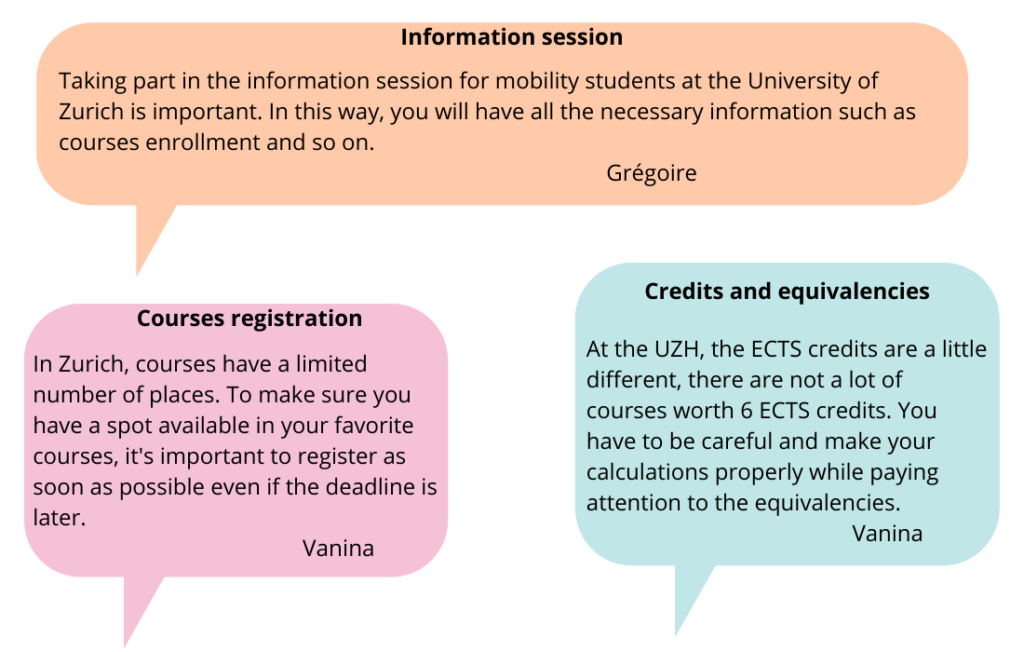

Geneva
UZH students also share their experiences concerning courses and exam registration at UNIGE. As this process can vary by faculty, it is advised to check the requirements beforehand at the faculty secretariat. UZH students also highlight the opportunity to take free french courses.
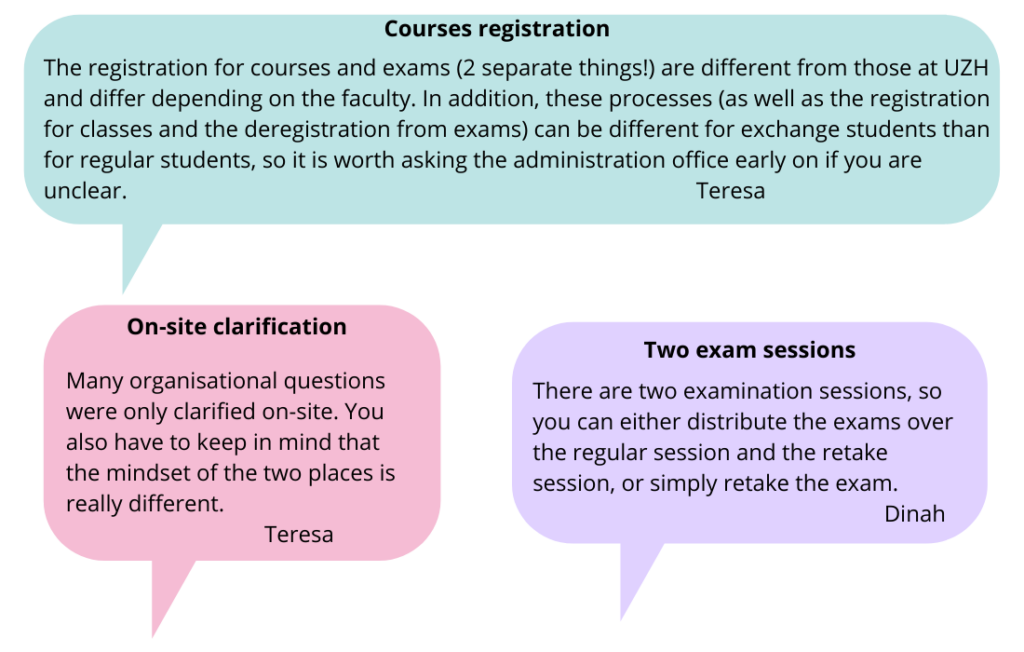

Credits: header picture – Freddy Castro
Roundtable at the UNECE Regional Forum on Sustainable Development
On the 17th of March 2021, the University of Geneva and the University of Zurich jointly organised a side-event at the UNECE Regional Forum to discuss new ways to shape more resilient societies. Through a discussion moderated by Elizabeth Pfund, Swiss Triple Impact regional coordinator at B Lab Switzerland, a panel of experts from the two universities as well as from the private and public sectors tackled the very vast issue of resilience through different lenses.

Opening the roundtable, Jacques Ducrest, Delegate of the Swiss Federal Council for the 2030 Agenda, declares that “we probably all had a different situation in mind when the Decade of Action to deliver the 2030 sustainable goals was launched in 2019.” Indeed, Covid-19 came as a reminder that there is still a long way to go before attaining a more sustainable world. To move forward in this direction, Jacques Ducrest argues that the three pillars of sustainability brought forward by the United Nations, namely environmental responsibility, social solidarity, and economic performance, have to be kept in balance. To this end, “we cannot respond in silos,” he affirms. And the interrelated consequences of the pandemic seem to prove him right.
Transversal consequences and solutions
Indeed, the Covid-19 pandemic has highlighted the true interconnectedness of all sectors. For example, Stéphanie Dagron, Professor of Law at the University of Geneva, shows how the current health crisis is actually a human rights crisis, revealing long-established social inequalities. Maria J. Santos, Professor in Earth System Science at the University of Zurich, puts forward the challenges brought by concurrent shocks, especially concerning pandemics, biodiversity and climate change. Indeed, those three elements share similar characteristics: they are all non-natural phenomena and, most importantly, they have a strong impact on one another.
While the consequences unfold, solutions can also be found in and across various sectors. According to Ralph Ossa, Professor and Chairman of the Department of Economics at the University of Zurich, international trade is one of them. He explains how resilient international trade has been during the pandemic: as demand for non-tradable goods has suffered, the one for tradable goods has thrived. International trade has thus been a key contributor in the global resilience, allowing to adapt to new living and working conditions, such as the implementation of home office, while at the same time enabling transportation of medical supplies.
For Alois Zwinggi, Chair of the Innovation Council at Innosuisse and Member of the Managing Board at the World Economic Forum, innovation and technology are two important elements to prepare and put production, people and the planet back on their feet. To this end, Innosuisse has launched an initiative to support science innovation dealing with the accelerated digitalisation occurring because of the pandemic, but also tackling the issues of climate change and working towards sustainability.
According to Prof. Stéphanie Dagron, the pre-existing socio-economic crisis drastically undermines the efforts to limit the current pandemic. To palliate those issues, she argues that technical preparation of countries is not enough. Indeed, she is convinced that human rights to health, the right to social protection as well as other socio-economic rights, have to be taken into account in the countries’ preparedness to pandemics. “It is the combined attention for the protection and promotion of all those rights that is in my view essential for a more rapid and sustainable recovery”, she affirms.
Resilience as a pre-emptive activity
“Building resilience is done before things happen, it is a pre-emptive activity. Once you are in reaction mode, it’s too late” indicates Dr Quentin Ladetto, research director at armasuisse, emphasising the importance of foresight. More than forecast, he argues, foresight is about “opening minds, presenting alternatives, challenging assumptions and removing cognitive biases.” The invisible has thus to become visible, the unpredictable to become predictable. Yet, to make sense of multisectoral and global challenges, a transversal approach is key.
“Resilience does not exist in isolation, but as a world community”
Dr Amanda Hosken
For Dr Amanda Hosken, Global Head of Life and Health Solutions at Swiss Re, it is thus crucial that people who have data and knowledge take the responsibility to share information. This is the only way to initiate a crucial global discussion across civil society, public, private and academic sectors. Indeed, she reaffirms, “resilience does not exist in isolation, but as a world community”.
What now?
“No rocket science, but practical down to earth steps: know against what to be resilient, prioritise, act”
Dr Quentin Ladetto
What are the concrete actions to take in order to set up this much-needed resilience across sectors? To illustrate this point, Dr Quentin Ladetto suggests a telling metaphor: “building resilience is like building a forest”. To ensure every single tree grows, actors have to determine priorities and make decisions accordingly. This is “no rocket science”, he explains, “but practical down to earth steps: know against what to be resilient, prioritise, act”. For the first leaves to grow, a society should dedicate resources to foresight.
The “Shaping Resilient Societies” initiative will continue to bring actors together and initiate concrete actions towards resilience.
Watch the «Best of» video of the event.
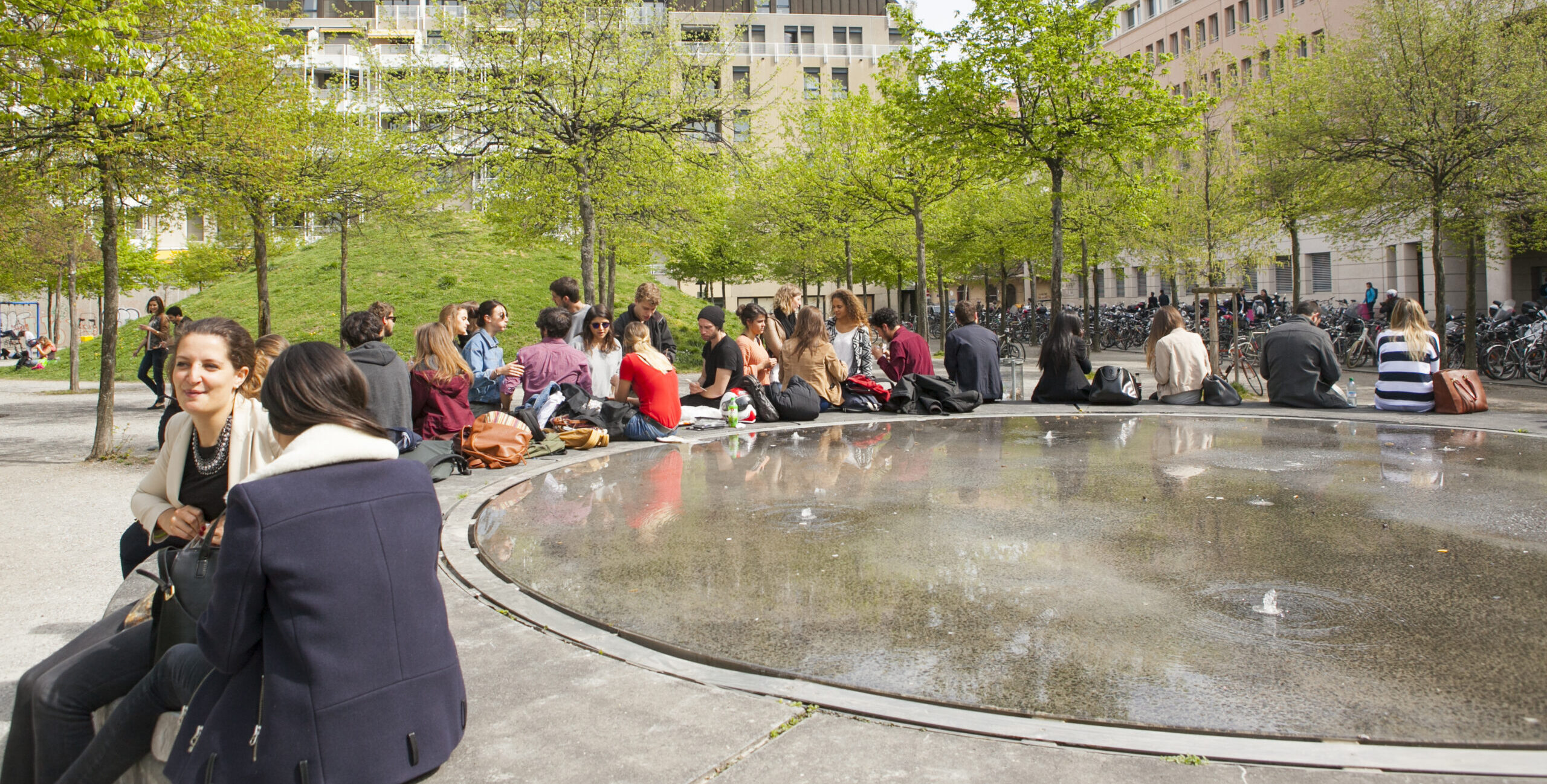
The perks of a national exchange
When it comes to academic exchanges, possibilities of destinations seem endless and for every taste, some more exotic than others. Opting for a national exchange, however, may be a less obvious choice. Breaking stereotypes and putting down apprehensions, some UNIGE and UZH students who took part in an exchange programme between the two universities have shared their experience, revealing the perks of a Swiss adventure.
Whether to discover more about Switzerland, to learn a national language or to embrace the vast diversity of their study field, the reasons behind the students’ choice to do a student exchange between the two cities vary. However, their testimonials all have this in common: going on an exchange in Switzerland offers its own unique opportunities and is thus worth just as any other.
Changing scenery while still staying at home
Doing an exchange is often synonymous with a change of air, discovering new places and different cultures. While going abroad is often seen as the only option, staying in Switzerland can also offer a cultural escape. Having tried the experience, Charlotte, a law student, is convinced, “we can change scenery even by staying in Switzerland.” Several students from the French-speaking and German-speaking parts of Switzerland agree that the mindset as well as diverse cultural aspects are different on the other side of the language divide.
“These same things that are so different.”
Estelle
And still, in some corners, students find familiar institutions and landmarks; “these same things that are so different,” comments Estelle. It is this duality that attracts Vanina in a national exchange. While living in a different atmosphere, she appreciated being in the same country and being able to go home easily. As Kim notes, the three hours train ride from Geneva to Zurich only felt like 30 minutes.
A comprehensive view of the disciplines
Switzerland has the particularity of holding an astonishing diversity within a very small area. Accordingly, students highlight the importance of apprehending their discipline from another part of the country. For instance, Grégoire points out that in law, 70% of the legal content and practice is in German, 30% is in French, but the material forms a comprehensive whole. Recalling one of his professor’s words, he uses the following meaningful metaphor: “If you go to the doctor and he tells you ‘I only know 30% of the material, the rest is not in my language’ or another doctor who says, ‘I know the subject 100%’, who do you chose?” After all, it is almost a necessity for a practicing lawyer in Switzerland to master two national languages.
Based on the same observation, Estelle, student in educational science in Geneva, “wanted to know better how it was elsewhere” in Switzerland. Kim and Elsa, both law students at the University of Zurich, have benefited from the different expertise of the two largest comprehensive universities in Switzerland. Indeed, they had the opportunity to follow international law classes at the University of Geneva, learning from renowned experts.
A national language catalyst
“It was a key experience that I recommend to every ‘French-anxious’ person!”
Kim
Almost all interviewed students agree on the added value of a Swiss exchange in terms of language. While knowing every additional language is an asset, mastering an additional national one proves to be an added value to work in Switzerland. Indeed, Estelle and Grégoire agree, it is a particular strength to put forward on their CV. Still, be it French or German, the two languages can be tough to tackle. As a French-speaker, Charlotte is optimistic: “Don’t be afraid and go for it!”, according to this law student, the best way to improve is to practice. After a few intense weeks of natural acclimation, “it was a key experience that I recommend to every ‘French-anxious’ person!” agrees Kim.
To assure a smooth transition, both universities offer different options to practice the language. The Law Department of the University of Zurich, for instance, offers a Buddy Program, and there are different tandem opportunities. In Geneva, “as an exchange student, you can take language courses free of charge, which I think is a thoughtful offer that I can recommend”, affirms Kaja.
“There is less paperwork than for going abroad, by the way”
Elsa
Going on an exchange in Switzerland is not only beneficial for reinforcing studies and learning about Switzerland in its variety, but more so, “there is less paperwork than for going abroad, by the way”, claims Elsa. This administrative ease allows to devote time for other important tasks, such as finding housing or simply concentrating with more ease on the studies.
Doing a student exchange within Switzerland means all the perks of travel, discovery, change of scenery, new professors and classes, new friends, and better language skills, minus the hassle of much paperwork, visa or insurance issues.
Credit for the picture in the header: Jacques Erard, Université de Genève
Expert Dialogue on Shaping Resilient Societies, 12.11.2020
A multistakeholder approach to resilience
The Covid-19 pandemic has brought unprecedented challenges for the society as a whole, transcending sectorial barriers. This unparalleled situation enhances the need to tackle the concept of resilience. In this context, and within the frames of the UNIGE-UZH strategic partnership, a multistakeholder initiative was launched to shape resilient societies. In collaboration with the Geneva Science Policy Interface (GSPI), the World Economic Forum (WEF), the Federal Department of Foreign Affairs and selected international organizations, a first Expert Meeting took place on 12 November 2020, bringing together more than 60 experts in different fields.

As Covid-19 has heterogeneous implications, blurring boundaries between public and private, national and international interests, the initiative aims at breaking up silos and at giving priority to a transversal approach. It thus seeks to provide scientific evidence to policy formulators and decision makers.
On the positive side, this unique situation resulting out of a pandemic, reaffirms the need of a high-level international involvement and sparks new multidisciplinary collaborations. How to foster these collaborations? How to facilitate the cooperation between the different stakeholders? The sixty experts discussed new interdisciplinary paths towards making societies more responsive and better prepared within the following thinking groups: (1) Health system strengthening; (2) Global health law, human rights and ethics; (3) Governance Mechanisms for Access & Use of Data in Public Health Crises; (4) Building Socio-Economic Resilience to Global Shocks; (5) Turning point COVID-19: Re-shaping healthcare to successfully battle epidemics and pandemics; (6) Pandemics, Climate and Sustainability.
Transversality and mutual benefits
Because one particular issue can have so many dimensions to it, sectors should not be isolated in the implementation of long-term solutions to make societies more resilient. For instance, sustainability cannot be addressed without considering the perspectives of people, the planet and profit.
Experts agreed that all sectors should work together transversally towards a common goal. Finding mutual benefits seems therefore the key to creating powerful alliances and generating innovative impact.
Science as a radar system
Experts agreed that the pandemic amplifies the need to include the scientific community in the decision-making process. Even if Covid-19 has created a favourable environment to foster joint efforts, this cooperation has to be further strengthened and facilitated. To this end, participants agreed on the crucial need to create a stronger interface between the scientific community and policy formulators and decision-makers. To further enhance its accessibility, science should also be more approachable to a larger public.
Building resilient societies is not just about finding solutions in times of crisis. It is about preparing societies to potential future shocks. Scientists should thus serve as a radar system and work closely with policy and decision makers in the risk assessment and management process, from an early stage on.
Local to global, global to local
Generating global impacts towards resilience must be based on equity and solidarity. With this in mind, the experts specifically acknowledged the importance of including local and vulnerable communities to the path to resilience. The latter would have to be, in particular, protected by strong human rights.
Vulnerable communities should not only be protected, they should serve as an example. Indeed, some participants drew attention to the difficulty to act upon the lessons learned. Conclusions are, even though often similar, global solutions often fail to be implemented. The solution to this problem seems to lie within the local level. Indeed, experts agree on the added value to coordinate local initiatives in order to co-create changes globally.
Through ongoing and future joint activities, the 60 experts continue to build bridges between sectors, nations and disciplines in order to encourage the societies to pave the way for upcoming future challenges.
Picutre credit for the header: World Economic Forum
Picture credit for the article: Mirko Bozzato
